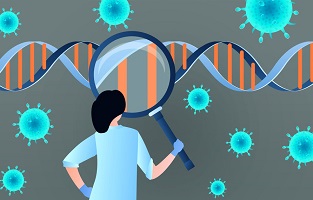COVID-19 News: Researchers Uncover That The OAS Gene Family Plays A Critical Role In COVID-19 Induced Heart Failure
COVID-19 News - OAS Genes - Heart Failure Mar 24, 2023 2 years, 9 months, 3 days, 5 hours, 20 minutes ago
COVID-19 News: COVID-19, the ongoing global pandemic caused by the SARS-CoV-2 virus, has been shown to not only cause severe respiratory illness but also damage multiple organs, particularly the heart. This can lead to myocardial injury, heart failure (HF), and even cardiac death.

Heart failure is the fourth most common complication of COVID-19, and it is also the final outcome of numerous cardiovascular diseases.
https://pubmed.ncbi.nlm.nih.gov/32171076/
The high mortality rate associated with heart failure makes it crucial to investigate the regulatory mechanisms of HF in COVID-19 patients to better control the adverse cardiac consequences of this infectious disease.
Researchers from Shanxi Medical University, Taiyuan-China have in a new study found that the OAS gene family plays a critical role in in COVID-19 induced heart failure.
The 2',5'-oligoadenylate synthetase (OAS) gene family, which includes OAS1, OAS2, OAS3, and OASL, encodes interferon (IFN)-induced antiviral proteins and is associated with antiviral immune responses in COVID-19.
OAS gene family participates in antiviral biological process and innate immune. Upon virus infection, OAS genes catalyze ATP into 2ʹ,5ʹ-linked oligomers of adenosine in the presence of double-stranded (ds) RNA. These oligomers then activate RNaseL . OAS proteins act as a sensor of dsRNA and can activate RNaseL.
OAS/RNase L pathway plays a critical role in establishing antiviral state and halting viral infection. In this process, NOD-like proteins can interact with the OAS family to enhance the activity of RNaseL. The degraded RNA activates retinoic acid-inducible gene-I (RIG-1. RIG-1 amplify production of IFN-α/β and activate NF-κB to produce inflammatory factors, leading to cell apoptosis.
In addition, the JAK-STAT pathway and IFN regulatory factor (IRF) family are involved in the regulation of this process.
However, for a long time now, it was still unclear whether the OAS gene family plays a beneficial or harmful role in SARS-CoV-2-infected cardiomyocytes and COVID-19-induced cardiac injury and failure.
In this comprehensive study, the research team from Shanxi Medical University hypothesized that the OAS gene family is an effective mediator for COVID-19 to worsen cardiac function and cause heart failure.
Past
COVID-19 News coverages showed that the OAS genes especially OAS1 was also involved in disease progression and severity of SARS-CoV-2 infections.
https://www.thailandmedical.news/news/university-of-college-london-study-shows-that-both-the-oas1-gene-is-a-risk-factor-for-both-alzheimer-s-disease-and-covid-19-severity
ity-in-diabetic-kidney-disease-patients">https://www.thailandmedical.news/news/researchers-identify-hub-genes-stat1,-irf7,-isg15,-mx1,-and-oas1-that-increases-covid-19-severity-in-diabetic-kidney-disease-patients
https://www.thailandmedical.news/news/breaking-german-study-discovers-eight-human-proteins-and-genes-that-determine-covid-19-outcomes-with-the-elf5-gene-being-most-important
https://www.thailandmedical.news/news/covid-19-immuno-genetics-university-of-edinburgh-study-confirms-that-genes-could-be-key-to-new-covid-19-treatments
https://www.thailandmedical.news/news/covid-19-genetics-university-of-edinburgh-study-confirms-that-genes-are-critical-to-new-covid-19-treatments
https://www.thailandmedical.news/news/covid-19-genetic-risk-variants-significantly-associated-with-the-expression-of-11-protein-coding-genes-that-impact-immune-cell-types-and-disease-sever
The OAS genes were also implicated in the Multisystem Inflammatory Syndrome (MIS-C) in children infected with SARS-CoV-2.
https://www.thailandmedical.news/news/covid-19-news-defective-or-mutated-host-osa-genes-found-to-be-related-to-sars-cov-2-induced-multisystem-inflammatory-syndrome-in-children-
Using extensive bioinformatic analyses and experimental validation, the study team found that the expressions of OAS genes were significantly upregulated in both SARS-CoV-2-infected cardiomyocytes and failing hearts of COVID-19-free cases.
This supports the study team’s hypothesis and suggests that the OAS gene family promotes the development of Heart Failure in COVID-19.
Targeting OAS genes may be a potential therapeutic approach in treating COVID-19-associated heart failure.
Numerous past studies have found that untimely or overreacted antiviral responses may cause an imbalance in the immune system, leading to an inflammatory response or cytokine storm.
SARS-CoV-2 infects respiratory cells and other cells, including cardiomyocytes, causing host cell apoptotic death by inducing inflammation and even cytokine storm, which may worsen cardiac function and cause heart failure.
The study findings support the idea that the OAS gene family serves as a common genetic factor in COVID-19 and heart failure, potentially mediating the development of both diseases.
The study team also explored the potential OAS gene family-regulatory chemicals or ingredients using the Comparative Toxicogenomics Database (CTD) and SymMap database.
The study team found that estradiol, a hormone that plays an important role in anti-inflammation and suppression of virus-induced innate immune inflammatory response, could regulate the expression of OAS genes.
Estradiol has been shown to have protective effects on the heart, including the damaged heart in COVID-19. Further experimental verification is required to understand the effect of estradiol on the OAS gene family.
https://pubmed.ncbi.nlm.nih.gov/30051400/
https://pubmed.ncbi.nlm.nih.gov/27028912/
https://pubmed.ncbi.nlm.nih.gov/30376877/
https://pubmed.ncbi.nlm.nih.gov/33497359/
This study has several limitations, including the inability to obtain cardiac tissues from COVID-19 and HF patients for verification and the need for further experimental verification of estradiol's effect on the OAS gene family. Despite these limitations, our findings highlight the crucial role of the OAS gene family in COVID-19-induced heart failure and suggest potential therapeutic targets for cardiac injury and HF in COVID-19 patients.
The study team concluded, “OAS genes exhibit elevated expression levels in cardiomyocytes infected by SARS-CoV-2, heart tissues of COVID-19 patients, and failing human hearts not affected by COVID-19, potentially serving as crucial connectors between COVID-19 and heart failure (HF). Upon interacting with the invading SARS-CoV-2 virus, OAS genes activate the OAS/RNaseL antiviral defense mechanism to break down viral RNAs. The resulting smaller viral RNA fragments stimulate NF-kB inflammation-associated pathways, leading to the production of inflammatory factors or even cytokine storms, which ultimately cause cell death and heart failure.”
The study findings were published in the peer reviewed Journal of Translational Medicine.
https://translational-medicine.biomedcentral.com/articles/10.1186/s12967-023-04058-x
For the latest
COVID-19 News, keep on logging to Thailand Medical News.
